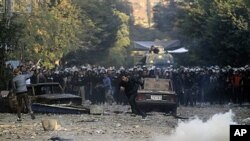Egyptian state television reports that the country's interim cabinet resigned Monday, following three days of anti-military protests and a fierce security crackdown. Authorities say at least 22 people have been killed and more than 1,700 others wounded in demonstrations that have spread to cities across the country in what some analysts are calling Egypt's "second revolution."
The offer by the civilian political leadership to step down has barely affected the mass protests in Cairo's Tahrir Square or other demonstrations across the country. Throughout the day, as the crowds surged and battles with security forces grew more violent, the focus of anger was on the military.
“No Tantawi," said a protester. "No Tantawi. No Tantawi. I will say for Marshal Tantawi everybody in Egypt says, ‘Go! You should be go!’”
Protesters say the interim government has served only Field Marshal Mohammed Hussein Tantawi, the head of the ruling Supreme Council of the Armed Forces.
The current crisis was sparked by the deputy prime minister, Ali al Selmi, who proposed that the military's political influence be part of a new constitution. The idea offended the protesters and the military subsequently abandoned the proposal. But the violence has escalated.
“Mr. Tantawi is a soldier," said a protester. "Soldiers have a place - to keep us and to fight our enemy outside Egypt, not to direct their guns to us here inside the country."
The violence was sparked by a crackdown Saturday on a few hundred people who stayed in Tahrir Square after a predominantly Islamist rally the day before.
Long-time dissident and publisher Hisham Kassem says Egypt's security forces know no other way to respond.
“Our police force and even the military elements that support them or help them are not trained to break up a riot properly," said Kassem. "They either withdraw or it’s excessive use of force. In fact, they have been trained under [former Egyptian President Hosni] Mubarak to use force excessively and unnecessarily. So it’s become a standoff.”
Many in the crowds took part in the uprising that brought the military to power in February. Frustration has been mounting for months at delays in what the military initially promised would be a six month transition period, but is now set to last until 2013.
Authorities say the next key step in the political process, parliamentary elections, will begin next week. Representative government was one of the key demands uniting protesters in the January uprising, which encompassed fundamentalist Muslims, Coptic Christians, secularists and political movements ranging from conservative to liberal.
But the euphoria of earlier this year has been missing in this round of demonstrations. Publisher Hisham Kassem holds out hope that if the elections go ahead - and he says the military wants them to take place - some of that optimism could return.
“If they stay much longer, they’re going to be facing much more violence, and they’re aware of that," he said. "And none of them are really interested in staying in power. Like they said, 'We know how to run a military. We don’t know how to run a country.' And with the election of a parliament and a president, a new hope, a new grace period will be given to the people.”
But as the crowds grow and protesters call for a "million man" rally across Egypt on Tuesday, anger is rivaling optimism.




